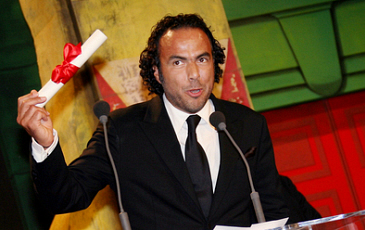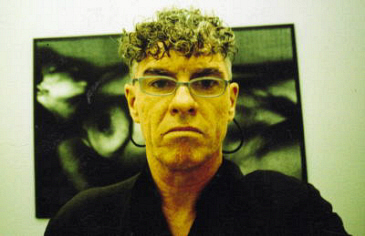“Newspapers, which increased rates for movie advertising as other categories fell apart after the dot-com bust, may be partly to blame for the prospect of a paperless movie industry. ‘I know everyone is trying to make it come true because the cost of print ads could be considered extortion in some jurisdictions,’ said Mark Cuban, who founded 2929 Entertainment, which produces, distributes and exhibits a variety of films. ‘Every distributor wants to find the best promotional mix away from traditional media and get a far greater bang for their buck,” Mr. Cuban said.” — from David Carr‘s N.Y. Times piece about two and a half topics — the changing movie-marketing landscape, the ongoing animus between big-wheel distributors and film critics (and how distribs circumventing critics is becoming an increasingly common tactic), and how critics (especially print critics) are dropping more and more off viewer radar screens these days.
wired
“This is not a movie that is likely to draw many people who don’t agree with its premise,” writes Time‘s Karen Tumulty in her piece that pays a certain attention to Al Gore‘s An Inconvenient Truth, but is more taken with the ex-Vice President’s newfound movie-celebrity aura that came from his promoting Truth at the Cannes Film Festival last week. The above quote essentially passes along the notion that the incontrovertible evidence that global warming has reached a very critical stage is (here we go again) a debatable premise. This is appalling irresponsible horseshit on Tumulty’s and Time‘s part, and a prime example of how mainstream corporate-owned media, in the name of being “fair” and “balanced” and airing both sides of an issue, spins the Big Lie. As long as equivocating fence-sitters keep saying that global warming is debatable and that there’s another way to look at it (i.e., the proverbial Bush-Cheney view that we don’t want to go off half-cocked, that we’ve got fat incomes to consider, that there’s time to sort things out without radically changing course, that things aren’t as bad as Gore and the greenheads say), the carbon alcoholics who are dug into their denial foxholes about their energy-consuming lifestyles will have a rationale to cling to. As Gore says in the film, scientific journals are unanimous about global warming, but when you read mainstream media the fudging kicks in. Nice work, guys. Keep it up.
When the news is sluggish and the domestic releases don’t feel all that exciting, run an evergreen piece. This one, amusing and well-reported and written by Newsweek ‘s Devin Gordon, is about what an expensive cumbersome pain-in-the-neck movie premieres have become in the eyes of studio publicists and talent-reppers. I knew that “a perfectly serviceable premiere can be arranged for about $100,000” but not that “most cost at least three times that.” The piece echoes the mixed, not wondrously happy emotions voiced in that Variety piece I linked to yesterday that asked whether the big-studio Cannes premieres were worth it. But who really wants to see premieres go away? As Gordon’s piece indicates, the talent would feel dissed if the studio didn’t throw one in honor of their new film. Besides, the industry generally loves them for their ritualistic aspects. I know a lot of women in Los Angeles who would feel lost at sea and without much to do with their lives if there were no premieres to haunt every week.
There’s a passage from Adam Gopnik‘s New Yorker piece about David Andress‘s “The Terror: The Merciless War for Freedom in Revolutionary France” (Farrar, Straus & Giroux) that got my blood going more than all of Sofia Coppola‘s Marie-Antoinette did. Cannes ’06 is history and I’d normally leave this appallingly self-centered film alone, considering the October release date in the States and all, but Marie-Antoinette is playing in Paris right now, and all those metro posters have a way of seeping into your bloodstream. “It was the secret flight of the King’s family from their palace in Paris to Varennes on the night of June 22, 1791, that precipitated the Terror,” Gopnik writes. “The weak and well-meaning King Louis XVI” — Jason Schwartzman in Coppola’s film — “got talked into fleeing toward the border of the Austrian Netherlands, where loyalist troops waited. Andress places some of the blame for this folly on the queen, Marie-Antoinette, who, true to her popular reputation, could not accept that things had changed or see that a monarchy non-absolute in power would be better off in the long run. The King’s flight was a galvanizing event for the revolutionary radicals in Paris; it at once vindicated their fears and justified their excesses.” It occurred to me as I read Gopnik’s piece that Coppola’s film might have have had at least some sense of dramatic urgency or historical fibre if she’d structured it as a flashback thing that begins and ends with Marie-Antoinette in prison, awaiting her execution and having little to do but think back to the balmy Versailles days, when life was odd and constricted and regulated, and yet tranquil.
And (a) Le Divette du Moulin on rue Lepic — Sunday, 5.28.06, 5:50 pm; (b) Doudingue, a cool little restaurant on the corner to the left, sitting in a centrally located portion of Montmartre’s rue Durantin — Sunday, 5.28.06, 6:30 pm; (c) Near entrance to the metro at Place Clichy — Sunday, 5.28.06, 9:45 pm; (d) Four of five blocks north of Gare du Lyon — Monday, 5.29.06, 9:25 am; (e) arched stone entranceway to a courtyard like a million others in Paris…except that this one seemed different; (f) rue d’Abesses — Sunday, 5.28, 6:15 pm.
“It’s a shame,” a studio exec told Variety‘s Nicole Laporte and Ian Mohr in a story about the peril of screening big-studio films at the Cannes Film Festival. “Cannes is a way to get so much exposure in one weekend and accumulate good will in the media. You work for this your whole life, and then the critics make it so awful.”
Kudos to Emanuel Levy for alerting the L.A. community in unequivocal terms that Babel is Oscar-worthy and demanding of everyone’s attention, etc. Which it is.
A stunning surprise Palme D’Or winner: Ken Loach‘s The Wind That Shakes the Barley has taken the big prize, despite a nearly unanimous press consensus in recent days that the winner would be either Pedro Almodovar‘s Volver or Alejandro Gonzalez Innaritu‘s Babel.

Best Director winner Alejandro Gonzalez Innaritu
Loach’s was the first ’06 Cannes competition film I genuinely admired (I said something about it being Loach’s best in a long while, etc.) so there’s no argument from this quarter. (The N.Y. Times‘ Manohla Dargis, noting that Barley was the 13th time Loach had brought a film to Cannes, is saying “this year he got lucky.”) Loach in his acceptance speech called the film and the award “a little step in the British confronting their imperial history…maybe if we tell the truth about the past, we can tell the truth about the present.” I would have been a tiny bit happier about Babel taking the Palme D’Or, but that’s water under the bridge. The Cannes jury, indicating the strong degree of Babel support among them, handed the Best Director prize to Innaritu, as well as a special Superior Editing Award to Babel‘s Stephen Mirrione. The entire female cast of Volver (Penelope Cruz, Carmen Maura, Lola Duenas, Blanca Portillo, Yohana Cobo and Chus Lampreave) won an esemble Best Actress award, and nearly the entire male cast of Rachid Bouchareb‘s Indigenes (Jamel Debbouze, Samy Naceri, Roschdy Zem, Samy Bouajila and Bernard Blancan) won the Best Actor award. The Best Screenplay award went to Almodovar’s Volver, the Grand Prix award was handed to Bruno Dumont‘s Flandres, and the Jury Prize went to Andrea Arnold‘s Red Road.
Variety‘s Justin Chang on Guillermo del Toro‘s Pan’s Labyrinth: “…a richly imagined and exquisitely violent fantasy…a fairy tale not even remotely intended for children, this entrancing magical-realist drama concocts a sinister spin on ‘Alice in Wonderland’ against the war-torn backdrop of 1940s Spain, shifting between two worlds with striking craft and discipline . With its graphic phantasmagorical elements and Spanish-language dialogue, pic will rely heavily on strong reviews and the loyalty of del Toro’s fans when Picturehouse releases it Stateside in October.”
It’s not that I’m hostile, but I’m deeply uninterested in the low-rent culture of Mexican wrestlers and why they can’t reveal their faces by taking their douchebag masks off and how some or most of this crap fits into Nacho Libre, blah-blah. No offense to first-rate feature writer Lewis Beale, who wrote about all this for the N.Y. Times, but I couldn’t finish the piece.
More Chris Doyle-trashing-Martin Scorsese stuff, this from a fall ’05 issue of Filmmaker magazine. (Thanks to JD for passing it along.)

Cinematographer Christopher Doyle
I’m a tiny bit surprised to read that Pedro Almodovar‘s extremely fine Volver is favored to win the Palmes D’Or this evening. My reading in Cannes was that it was in a neck-and-neck race with Alejandro Gonzalez Innaritu‘s Babel, but whatever. The difference between the two is that the air starts leaking out of the Volver balloon towards the end after it “gives up the ghost”, while Babel holds true and steady all the way, and ends on a sublime and touching note.

